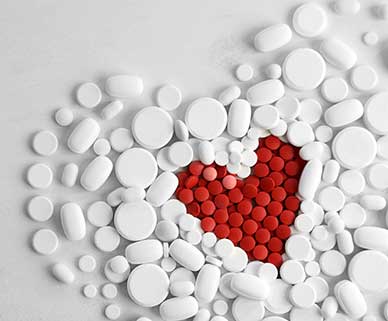Diabetes is one of the fastest growing health problems in the United States and Western World, with around a third of the American adult population currently diabetic or showing signs of developing diabetes. While this disease can be difficult to manage, it can often be treated or even prevented by controlling blood sugar. An increasing body of research suggests that your circadian rhythm may be an incredibly important factor in blood glucose levels and diabetes management. Understanding the way your blood sugar changes over the course of a day is crucial to taking proactive steps to prevent wide fluctuations.
What Is Diabetes?
Diabetes is a disease in which the body has chronically high blood sugar levels due to defects in blood glucose metabolism. In type 1 diabetes, the pancreas does not make insulin, a hormone that is critical to getting blood glucose out of the bloodstream and into cells where it is needed. In type 2 diabetes, the problem is more complicated: Although there may be normal or even high insulin levels, the cells have become insulin resistant. This means that they do not let blood sugar into the cell even when there is enough insulin. With both types of diabetes, blood sugar remains in the bloodstream where it is very destructive, while cells often starve for fuel.
Diabetes has increased in modern times to the point that it is now considered an epidemic. It is one of the most pervasive and expensive health problems in the United States. Even more distressing, rates of this disease and related disorders of the metabolism are expected to continue increasing for the foreseeable future. Americans have too much access to carbohydrate-rich foods; in fact, these are often the most accessible and affordable.
The Dawn Phenomenon and the Circadian Rhythm of Blood Sugar
Recent research indicates that circadian rhythm is a very important part of how our bodies metabolize blood glucose. Whether you are diabetic or not, your blood glucose likely follows a rhythm known as the “dawn phenomenon.” In this phenomenon, hormones released in the morning drive cortisol levels high. Cortisol is released, which decreases insulin and increases glucagon. This causes blood sugar to increase, ensuring that we are conserving energy to be used after we awake.
This hormonal release appears to be an important link between the circadian rhythm and blood sugar. Although this phenomenon is troublesome mainly for people with diabetes and other metabolic diseases, it occurs in almost all people. This is partially due to the influence of glucocorticoids such as cortisol. When researchers studied mice who had been administered glucocorticoids, they found that these hormones increased the activity of three different genes linked to circadian rhythm. In addition, the mice’s blood sugar levels increased.
Maintaining Healthy Blood Sugar Levels Naturally
 Whether you have type 2 diabetes or are in perfect health, maintaining stable blood glucose will help you to feel better and actually be healthier. There are several ways that you can accomplish this, including:
Whether you have type 2 diabetes or are in perfect health, maintaining stable blood glucose will help you to feel better and actually be healthier. There are several ways that you can accomplish this, including:
- Lose weight. Even getting a few pounds closer to a healthy weight can level out your blood sugar.
- Exercise for at least a half hour a day. Late night exercise can be especially beneficial if you often wake up with high blood sugars.
- Choose carbs wisely. People with diabetes can still eat carbs, but they should choose carbs mixed with fiber and other macronutrients rather than white sugar and white flour.
- Eat carbs at strategic times. There are likely times of day when you need a blood sugar bump, but eating carbs at night can lead to waking up with high blood glucose.
- Eat small and regular meals with balanced amounts of carbohydrates.
- Avoid nicotine and caffeine, which contribute to blood glucose fluctuation.
- Get eight hours of sleep a night, taking care to go to bed and awaken at roughly the same time. A healthy circadian rhythm contributes to better glucose metabolism.
- Eat a wide range of antioxidants.
- Follow your doctor’s recommended regimen, if you have one. It is important to take medications at the correct times and in the correct amounts.
- Take a multivitamin with plenty of antioxidants.
- Know your triggers. Every person reacts uniquely to different foods. It is important to know both your triggers and your safe foods.
There are also several healthy and natural supplements that can be used to keep blood sugar under control. Consider taking a supplement designed to support healthy blood sugar with ingredients such as chromium picolinate, N-acetyl cysteine, bilberry fruit, banaba leaf, vanadium, Gymnema, fenugreek and bitter melon. These ingredients each work in a different way to support healthy blood glucose and maintain metabolic balance. Magnesium has also been shown to protect against the development of diabetes.
While diabetes is common, there are many healthy and natural ways that people can prevent and even treat it. Maintaining control of your blood sugar will help you to feel better and actually be healthier, both now and over the course of your life. Understanding your circadian rhythm and how it affects your blood glucose is an important piece of this puzzle.
 There are several ways that taking in plenty of
There are several ways that taking in plenty of  There are several ways to ensure that you are
There are several ways to ensure that you are  A large part of maintaining good heart health is simply eating a range of vitamins and minerals. B vitamins, folic acid, calcium and
A large part of maintaining good heart health is simply eating a range of vitamins and minerals. B vitamins, folic acid, calcium and  Turmeric has been the subject of several recent studies due to
Turmeric has been the subject of several recent studies due to  How much soy protein do you need in your daily diet to get these health benefits? Doctors recommend that people take 50 mg of soy protein a day to improve their cardiovascular risk, or 40 to 80 mg a day if taking it to treat menopause or other hormonal imbalances. Regardless of the amount your physician recommends, there are a variety of ways to add more isoflavones to your diet. Consider adding some of these tasty foods to your diet:
How much soy protein do you need in your daily diet to get these health benefits? Doctors recommend that people take 50 mg of soy protein a day to improve their cardiovascular risk, or 40 to 80 mg a day if taking it to treat menopause or other hormonal imbalances. Regardless of the amount your physician recommends, there are a variety of ways to add more isoflavones to your diet. Consider adding some of these tasty foods to your diet: Many people eat yogurt and other probiotic foods for GI tract benefits. However, new research suggests that this delicious food may also be good for the bones. Researchers looked at the bone density of older adults who had different lifestyle factors. Unsurprisingly, exercising, maintaining a healthy BMI and taking plenty of calcium and vitamin D were all linked to higher bone density. However, yogurt consumption was also linked to stronger bones. In fact, elderly people who ate yogurt on a daily or regular basis
Many people eat yogurt and other probiotic foods for GI tract benefits. However, new research suggests that this delicious food may also be good for the bones. Researchers looked at the bone density of older adults who had different lifestyle factors. Unsurprisingly, exercising, maintaining a healthy BMI and taking plenty of calcium and vitamin D were all linked to higher bone density. However, yogurt consumption was also linked to stronger bones. In fact, elderly people who ate yogurt on a daily or regular basis  While there are several medications available to treat elderly people with low bone density, doctors increasingly recommend that people instead work to build healthy and strong bone throughout their lifetimes. This is best done with natural lifestyle changes such as exercise, diet and supplements. Research suggests that the following healthy measures all can contribute to good bone density:
While there are several medications available to treat elderly people with low bone density, doctors increasingly recommend that people instead work to build healthy and strong bone throughout their lifetimes. This is best done with natural lifestyle changes such as exercise, diet and supplements. Research suggests that the following healthy measures all can contribute to good bone density: